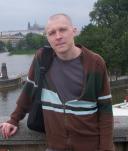|
MAIN PAGE
> Back to contents
Psychology and Psychotechnics
Reference:
Borzykh S.V.
The Elektronik's Syndrome
// Psychology and Psychotechnics.
2016. № 3.
P. 243-250.
DOI: 10.7256/2454-0722.2016.3.19253 URL: https://en.nbpublish.com/library_read_article.php?id=19253
Синдром Электроника
Borzykh Stanislav Vladimirovich
PhD in Philosophy
independent researcher
634050, Russia, g. Tomsk, prospekt Lenina, 68, kv. 313

|
c_tac@ngs.ru
|
|
 |
Other publications by this author
|
|
|
DOI: 10.7256/2454-0722.2016.3.19253
Received:
20-05-2016
Published:
29-06-2016
Abstract:
The object of the research is some rigidity of human thinking as a result of particular circumstances, cultural environment and epoch. Special attention is paid to the way we see this world, what we observe there and how we explain observed phenomena to ourselves and other people. The author of the article successively analyze all the factors that influence our world view and can't be ignored by anyone including a researcher. As the main research methods, the author apply medical principles of diagnostics of interrelated symtpoms and syndromic analysis. The main conclusion of the research is that there is a certain dependence between our way of thinking and particular circumstances we live in. The novelty of the research is caused by the fact that the author has used the methods and techniques that are not typical for making such conclusions. The author also assumes that we tend to solve our tasks by using methods that are convenient yet nto always beneficial.
Keywords:
syndrom, thinking, epoch, circumstance, culture, understanding, explanation, solution, mind, world view
References
1. Dzherom D.K. Troe v lodke, ne schitaya sobaki / D.K. Dzherom. M.: AST, 2006. 288 s.
2. http://dic.academic.ru/dic.nsf/enc_medicine/28878/Sindrom.
3. Morris I. Foragers, Farmers, and Fossil Fuels: How Human Values Evolve / I. Morris. Princeton University Press, 2015. 400 pp.
4. Darwin C. The origin of species / C. Darwin. Bantam Classics, 1999. 512 pp.
5. Kahneman D. Thinking fast and slow / D. Kahneman. Farrar, Straus and Giroux, 2011. S. 65.
6. Yakoboni M. Otrazhayas' v lyudyakh. Pochemu my ponimaem drug druga / M. Yakoboni. M.: Yunaited Press, 2011. 366 s.
7. Kun T. Struktura nauchnykh revolyutsii / T. Kun. M.: AST, 2015. 320 s.
8. Popper K.R. Predpolozheniya i oproverzheniya. Rost nauchnogo znaniya / K.R. Popper. M.: AST, 2008. 640 s.
9. Lakatos I. Izbrannye proizvedeniya po filosofii i metodologii nauki / I. Lakatos. M.: Akademicheskii Proekt, 2008. 480 s.
10. Borzykh S.V. Situativnaya i normativnaya logiki / S.V. Borzykh // Nauka v razlichnykh izmereniyakh: sbornik nachnykh trudov II Mezhdunarodnoi nauchno-prakticheskoi konferentsii, posvyashchennoi pamyati doktora filosofskikh nauk, professora G.F. Mironova, g. Ul'yanovsk, 17 – 18 maya 2010 g. / Pod red. T.N. Brysinoi. Ul'yanovsk. S. 89.
11. Rozin V.M. K utochneniyu ponyatiya «nauka» // Filosofiya i kul'tura. 2010. № 10. C. 29-38.
12. Rozin V.M. Pravdopodobnye konspirologicheskie teorii (diskursivnyi analiz) // Politika i Obshchestvo. 2016. № 3. C. 301-310. DOI: 10.7256/1812-8696.2016.3.18273.
13. Gurevich P.S. Kto on – chelovek? // Filosofiya i kul'tura. 2015. № 6. C. 797 - 801. DOI: 10.7256/1999-2793.2015.6.15598.
Link to this article
You can simply select and copy link from below text field.
|
|

